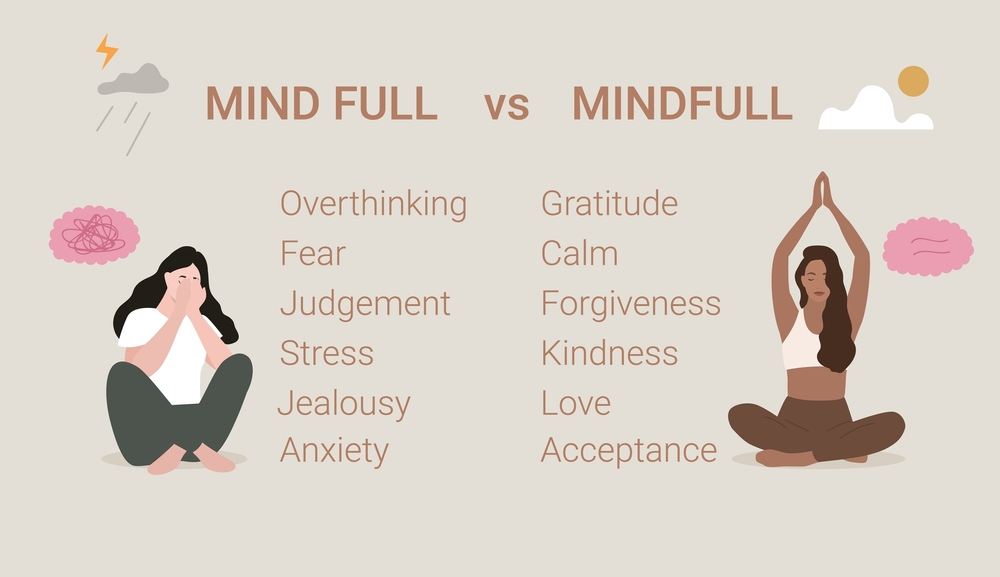Can Meditation Help with Overthinking? Exploring the Benefits of Mindfulness
Can Meditation Help with Overthinking? In today’s fast-paced and demanding world, overthinking has become a common struggle for many individuals. The constant stream of thoughts and worries can lead to anxiety, stress, and a lack of mental clarity. However, there is a powerful tool that can help in taming the overactive mind – mindfulness meditation. In this article, we will explore the benefits of mindfulness meditation and how it can assist in overcoming overthinking.
The Science Behind Overthinking
- Prefrontal Cortex and Overthinking: Overthinking is a cognitive process characterized by excessive and repetitive thoughts. It is often driven by heightened activity in the prefrontal cortex, a brain region responsible for decision-making and problem-solving. This overactivation can lead to a cycle of rumination and negative thought patterns, trapping individuals into overthinking.
- The Role of Negative Thought Patterns: Overthinking often involves negative thought patterns, such as self-criticism, worry, and fear. These negative thoughts activate the amygdala, the brain’s emotional center, further intensifying the cycle of overthinking. The amygdala triggers the release of stress hormones, contributing to increased anxiety and emotional distress.
- Breaking the Cycle with Mindfulness Meditation: Mindfulness meditation offers a way to break free from the cycle of overthinking. By practicing mindfulness, individuals develop a greater awareness of their thoughts and emotions without getting caught up in them. This non-judgmental observation allows for inner calm and helps individuals disengage from the constant stream of thoughts and worries.
- Neuroplasticity and Meditation: Research has shown that regular meditation practice can lead to structural and functional changes in the brain. This includes increased thickness in the prefrontal cortex, which is associated with improved cognitive function and decision-making abilities. By cultivating mindfulness through meditation, individuals can rewire their neural pathways and reduce the tendency to engage in overthinking.
Overthinking is driven by heightened activity in the prefrontal cortex and is often accompanied by negative thought patterns. However, mindfulness meditation offers a way to break free from this cycle. By practicing mindfulness and cultivating a non-judgmental awareness of thoughts, individuals can reduce overthinking and experience a greater sense of inner calm. The brain’s neuroplasticity allows for positive changes through regular meditation practice, leading to improved cognitive function and decision-making abilities.
Understanding the Power of Mindfulness Meditation
Mindfulness meditation involves directing one’s attention to the present moment without making judgments. It cultivates heightened awareness and acceptance of one’s thoughts and emotions.
Through regular practice, mindfulness meditation can rewire the brain, leading to increased focus, emotional regulation, and a sense of inner calm.

How Meditation Can Help with Overthinking
Meditation can be a powerful tool for overcoming overthinking. By practicing mindfulness meditation, individuals can develop a greater awareness of their thoughts without getting caught up in them. This non-judgmental observation allows them to break free from the cycle of overthinking and find a sense of inner calm.
Through regular meditation, individuals learn to recognize when their thoughts are spiraling into overthinking. This awareness enables them to redirect their attention back to the present moment, reducing the grip of overthinking.
Meditation also helps individuals develop a sense of detachment from their thoughts. Rather than identifying with every thought that arises, they learn to see ideas as passing mental events, allowing them to let go of unnecessary worries and anxieties.
By focusing on the breath or a specific point of attention during meditation, individuals train their minds to stay present. This practice strengthens their ability to remain grounded in the present moment, reducing the tendency to dwell on past events or worry about the future.
Furthermore, meditation promotes relaxation and stress reduction, often underlying factors contributing to overthinking. By calming the mind and body, individuals can experience a greater sense of peace and mental clarity, making it easier to break free from the cycle of overthinking.
Meditation can help with overthinking by cultivating mindfulness, detachment from thoughts, and a greater sense of presence. By incorporating regular meditation practice into their lives, individuals can develop the skills to overcome overthinking and find a sense of inner calm and clarity.
The Power of Mindfulness Meditation in Enhancing Focus
Mindfulness meditation involves training the mind to stay present and focused on the current moment. By practicing mindfulness, individuals can develop the ability to direct their attention intentionally and sustain it on a chosen object of focus, such as the breath or bodily sensations. This practice strengthens the neural pathways associated with attention and enhances focus and concentration.
Training the Mind to Stay Present
Overthinking often involves catching up in a stream of thoughts, leading to a scattered and unfocused mind. Mindfulness meditation helps individuals recognize when their attention drifts away from the present moment and gently brings it back. Training the mind to stay present reduces distractions and improves the ability to concentrate on tasks.
Breaking Free from the Cycle of Overthinking
Overthinking can be a repetitive and unproductive pattern of thought that hampers decision-making. By practicing mindfulness meditation, individuals can break free from this cycle by observing their thoughts without judgment and letting them go. This non-attachment to ideas allows for greater mental clarity and the ability to focus on the present moment, leading to improved decision-making.
Improving Decision-Making Abilities
The Link Between Mindfulness Meditation and Rational Decision-Making: Overthinking can cloud judgment and lead to impulsive or irrational decisions. Mindfulness meditation cultivates a state of non-reactivity and non-judgment, allowing individuals to observe their thoughts and emotions without getting carried away. This heightened self-awareness and clarity of mind enable individuals to make more rational and informed decisions.
Research Findings on the Effects of Meditation on Decision-Making
Scientific studies have shown that regular meditation can lead to structural and functional changes in the brain, particularly in the prefrontal cortex. The region in the brain responsible for executive functions, including decision-making, problem-solving, and impulse control, is located here. Research has found that meditation can increase the thickness of the prefrontal cortex, leading to improved cognitive function and better decision-making abilities.
Increasing Cognitive Function through Regular Meditation Practice
Mindfulness meditation has been found to enhance working memory, attentional control, and cognitive flexibility – all of which are crucial for effective decision-making. By regularly practicing meditation, individuals can strengthen these cognitive abilities, allowing for more focused and rational decision-making processes.

Promoting Emotional Well-being and Stress Reduction
Heightened levels of stress and emotional turmoil often accompany overthinking. Mindfulness meditation provides a refuge from these overwhelming emotions by allowing individuals to observe their thoughts and feelings without getting entangled. This practice promotes emotional well-being and reduces stress, creating a sense of inner peace. Studies have shown that mindfulness meditation can decrease the production of stress hormones and activate the relaxation response in the body.
Cultivating Self-Awareness and Acceptance
Mindfulness meditation fosters self-awareness, enabling individuals to recognize their patterns of overthinking. By observing these patterns without judgment, individuals can develop a sense of acceptance and compassion towards themselves. This self-compassion is crucial in breaking free from the cycle of overthinking and cultivating a more positive mindset. Research has indicated that mindfulness meditation can increase self-compassion and reduce self-critical thoughts.
Incorporating Mindfulness into Your Daily Routine
To reap the benefits of mindfulness meditation, it is essential to incorporate it into your daily routine.
Start by setting aside dedicated time for meditation, starting with just a few minutes each day and gradually increasing the duration as you become more comfortable. Locate a serene and relaxing spot where you can sit or recline, then close your eyes and direct your attention to your breath.
Additionally, integrating mindfulness into daily activities such as mindful eating or mindful walking can further enhance the practice. By bringing mindfulness into your everyday life, you can cultivate a more present and aware state of mind.
The Journey Towards a More Peaceful Mind
Overcoming overthinking is a journey that requires patience and consistency. It is essential to approach the practice of mindfulness meditation with an open mind and a willingness to embrace the present moment.
With regular practice, individuals can experience a shift in their relationship with their thoughts, finding a sense of peace and clarity amidst the chaos of the mind. It is important to remember that meditation is not about stopping thoughts but observing them without judgment.
By developing this non-judgmental awareness, individuals can break free from the grip of overthinking and cultivate a more peaceful and balanced mind.
Conclusion: Can Meditation Help with Overthinking?
Mindfulness meditation offers a powerful solution for those struggling with overthinking. By enhancing focus, promoting emotional well-being, and cultivating self-awareness, mindfulness can help individuals break free from the cycle of overthinking and find a sense of inner calm.
By incorporating mindfulness into daily routines, individuals can journey towards a more peaceful and balanced mind. So, why not embrace mindfulness and discover the transformative benefits it can bring to your life? Start your meditation practice today and experience the positive impact it can have on your overactive mind.







